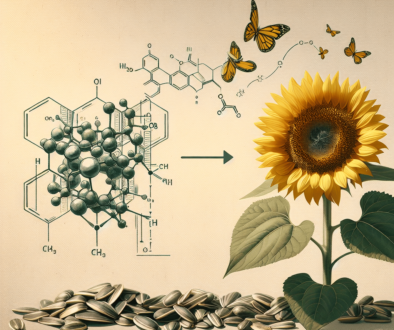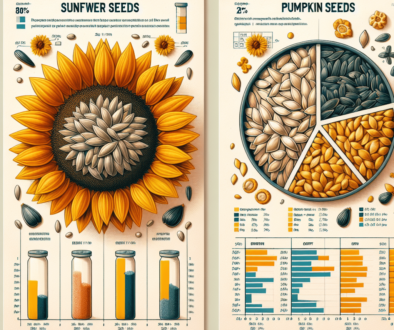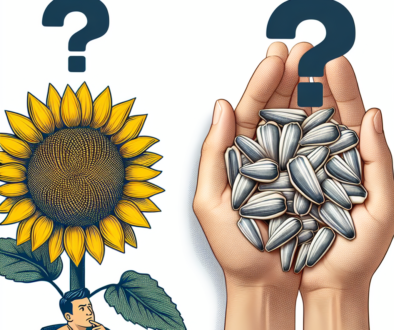Sunflower Butter vs Peanut Butter: Protein Face-Off
-
Table of Contents
- Sunflower Butter vs Peanut Butter: Protein Face-Off
- Nutritional Breakdown: What’s Inside?
- Sunflower Butter
- Peanut Butter
- Health Benefits: More Than Just Protein
- Benefits of Sunflower Butter
- Benefits of Peanut Butter
- Potential Drawbacks and Considerations
- Drawbacks of Sunflower Butter
- Drawbacks of Peanut Butter
- Environmental and Ethical Considerations
- Sunflower Butter’s Impact
- Peanut Butter’s Impact
- Usage in Diets and Recipes
- Best Uses for Sunflower Butter
- Best Uses for Peanut Butter
- Conclusion: Choosing the Right Butter for You
- Try ETprotein’s High-Quality Protein Products
Sunflower Butter vs Peanut Butter: Protein Face-Off

When it comes to choosing a nutritious spread for your toast or a protein-packed addition to your smoothie, the battle often comes down to sunflower butter versus peanut butter. Both are popular choices for those looking to add a creamy texture and a boost of protein to their meals, but how do they really compare? In this comprehensive analysis, we’ll dive into the nutritional profiles, health benefits, and potential drawbacks of each to help you make an informed decision in the protein face-off.
Nutritional Breakdown: What’s Inside?
Understanding the nutritional content of sunflower butter and peanut butter is crucial in determining which one might be the better choice for your dietary needs. Let’s break down the key components of each.
Sunflower Butter
- Protein Content: Sunflower butter typically contains around 5-7 grams of protein per two-tablespoon serving.
- Fat Profile: It is rich in unsaturated fats, particularly linoleic acid (an omega-6 fatty acid), and contains minimal saturated fats.
- Vitamins and Minerals: Sunflower butter is a good source of vitamin E, magnesium, and selenium.
- Fiber: It provides a decent amount of dietary fiber, aiding in digestion and satiety.
Peanut Butter
- Protein Content: Peanut butter also offers a substantial protein punch, with 7-8 grams per two-tablespoon serving.
- Fat Profile: Similar to sunflower butter, it contains mostly unsaturated fats but also has a slightly higher amount of saturated fats.
- Vitamins and Minerals: Peanut butter is rich in niacin, manganese, and vitamin E.
- Fiber: It contains fiber, although the amount can vary depending on the brand and processing.
Health Benefits: More Than Just Protein
While protein content is a significant factor, the health benefits of sunflower butter and peanut butter extend beyond their protein contributions.
Benefits of Sunflower Butter
- Heart Health: The high unsaturated fat content may contribute to improved heart health by reducing bad cholesterol levels.
- Antioxidant Power: Vitamin E acts as a powerful antioxidant, protecting cells from damage.
- Mineral-Rich: Magnesium and selenium play roles in various bodily functions, including immune response and thyroid health.
Benefits of Peanut Butter
- Heart Health: The monounsaturated fats in peanut butter can also support heart health.
- Energy Boost: Its combination of protein, fats, and fiber provides a sustained energy release.
- Antioxidant Properties: Peanut butter contains antioxidants that help combat oxidative stress.
Potential Drawbacks and Considerations
Despite their benefits, there are some considerations to keep in mind when consuming sunflower butter and peanut butter.
Drawbacks of Sunflower Butter
- Allergies: While less common than peanut allergies, some individuals may be allergic to sunflower seeds.
- Omega-6 Content: A high intake of omega-6 fatty acids can lead to an imbalance with omega-3 fatty acids, potentially contributing to inflammation.
Drawbacks of Peanut Butter
- Allergies: Peanut allergies are common and can be severe, making peanut butter unsuitable for many individuals.
- Aflatoxins: Peanuts can contain aflatoxins, which are toxic compounds produced by certain molds. However, strict regulations usually keep levels in food low.
Environmental and Ethical Considerations
The environmental impact and ethical considerations of sunflower butter and peanut butter production are also worth noting.
Sunflower Butter’s Impact
- Water Usage: Sunflowers typically require less water than peanuts to grow, making sunflower butter a more eco-friendly option in regions where water is scarce.
- Pesticides: Sunflower crops may be treated with pesticides, but organic options are available for those concerned about chemical use.
Peanut Butter’s Impact
- Crop Rotation: Peanuts are often used in crop rotation to improve soil health, which can be beneficial for sustainable farming practices.
- Carbon Footprint: The processing and transportation of peanuts can contribute to greenhouse gas emissions, but this varies by brand and sourcing practices.
Usage in Diets and Recipes
Both sunflower butter and peanut butter can be used interchangeably in many recipes, from smoothies and sandwiches to sauces and baked goods. However, their distinct flavors may be better suited to different culinary applications.
Best Uses for Sunflower Butter
- Sweet Treats: Its mild, nutty flavor pairs well with chocolate and fruit-based desserts.
- Savory Dishes: Sunflower butter can be used as a thickener for soups and stews or as a base for dressings.
Best Uses for Peanut Butter
- Asian Cuisine: Peanut butter is a staple in many Asian sauces and marinades.
- Breakfast Foods: Its rich flavor complements oatmeal, pancakes, and smoothies.
Conclusion: Choosing the Right Butter for You
In the sunflower butter versus peanut butter protein face-off, both spreads offer unique benefits and potential drawbacks. Your choice may depend on dietary restrictions, nutritional goals, environmental concerns, or simply personal taste. Sunflower butter is an excellent alternative for those with peanut allergies or looking for a spread with less saturated fat. Peanut butter, on the other hand, is a classic choice that provides slightly more protein and is deeply ingrained in culinary traditions.
Ultimately, both sunflower butter and peanut butter can be part of a balanced diet. Moderation is key, as with any food high in fats, even the healthy kinds. By considering the factors discussed in this article, you can make an informed decision that aligns with your health objectives and ethical values.
Try ETprotein’s High-Quality Protein Products
If you’re looking to enhance your diet with additional protein sources, consider exploring ETprotein’s range of organic bulk vegan protein and plant proteins. Their products, including Organic rice protein, clear rice protein, pea protein, clear pea protein, pumpkin seed protein, sunflower seed protein, and mung bean protein, are designed to meet the needs of various industries and dietary preferences.
ETprotein’s commitment to non-GMO, allergen-free, and neutral-tasting protein powders makes them a perfect choice for anyone looking to boost their protein intake without compromising on quality or flavor. Whether you’re a food manufacturer, a health enthusiast, or simply someone looking to try something new, ETprotein has a protein solution for you.
About ETprotein:
ETprotein, a reputable protein Chinese factory manufacturer and supplier, is renowned for producing, stocking, exporting, and delivering the highest quality organic bulk vegan protein and plant proteins. They include Organic rice protein, clear rice protein, pea protein, clear pea protein, pumpkin seed protein, sunflower seed protein, mung bean protein, etc. Their offerings, characterized by a neutral taste, non-GMO, allergen-free attributes, cater to a diverse range of industries. They serve nutraceutical, pharmaceutical, cosmeceutical, veterinary, as well as food and beverage finished product distributors, traders, and manufacturers across Europe, USA, Canada, Australia, Thailand, Japan, Korea, Brazil, and Chile, among others.
ETprotein specialization includes exporting and delivering tailor-made protein powder and finished nutritional supplements. Their extensive product range covers sectors like Food and Beverage, Sports Nutrition, Weight Management, Dietary Supplements, Health and Wellness Products, and Infant Formula, ensuring comprehensive solutions to meet all your protein needs.
As a trusted company by leading global food and beverage brands and Fortune 500 companies, ETprotein reinforces China’s reputation in the global arena. For more information or to sample their products, please contact them and email sales(at)ETprotein.com today.












